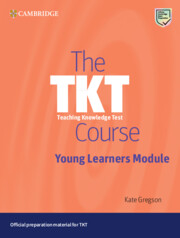Book contents
- Frontmatter
- Acknowledgements
- Contents
- Introduction
- Part 1 Knowledge of young learners and principles of teaching English to young learners
- Part 2 Planning and preparing young learner lessons
- Part 3 Teaching young learners
- Part 4 Assessing young learner learning in the classroom
- Follow-up activities: Answer keys and commentaries
- List of terms found in the TKT Glossary
- Glossary of TKT: Young Learners terms
- Test tips for TKT: Young Learners
- Teaching knowledge test young learners: Practice test
- Sample test answer sheet for TKT: YL practice test
- Answer key for TKT: YL practice test
Unit 7 - Additional classroom resources: How can I select, adapt and supplement classroom resources?
Published online by Cambridge University Press: 14 March 2024
- Frontmatter
- Acknowledgements
- Contents
- Introduction
- Part 1 Knowledge of young learners and principles of teaching English to young learners
- Part 2 Planning and preparing young learner lessons
- Part 3 Teaching young learners
- Part 4 Assessing young learner learning in the classroom
- Follow-up activities: Answer keys and commentaries
- List of terms found in the TKT Glossary
- Glossary of TKT: Young Learners terms
- Test tips for TKT: Young Learners
- Teaching knowledge test young learners: Practice test
- Sample test answer sheet for TKT: YL practice test
- Answer key for TKT: YL practice test
Summary
LEARNING OUTCOMES
By the end of this unit, you will…
KNOWLEDGE: know when and what kinds of additional resources teachers may plan for to enrich teaching and learning
SKILLS: be able to choose appropriate additional resources for a specific teaching context or moment
■ Starter Question
Before you begin this unit, read the starter questions and make some notes. Then read the commentary and compare it to your notes.
What do you understand by the term ‘additional resources’? Why use them in YL lessons? Write a definition and think of at least two reasons for using them.
COMMENTARY
Additional resources are, simply, learning resources that teachers use in addition to their course material. We sometimes see the equivalent term ‘supplementary resources’. The range of resources teachers might use to supplement their course material is almost limitless, but often they may use realia, flashcards, songs, video and so on. We will look at examples in more detail in the next section.
We saw in Unit 6 that course material often needs adapting and supplementing in order to make it more appropriate for our own learners. This may help us to:
engage learners, gain and keep their attention through active participation.
add interest, creativity, fun or physical activity to our lessons by balancing sitting time with moving time (stirrers and settlers).
add extra language or vocabulary practice activities.
provide language practice in a different way, using (a) different skill(s).
support understanding of topic, language or vocabulary.
extend learning of language or vocabulary, for example using the language in a different context, or adding some vocabulary items, perhaps those which are especially relevant to our own learners.
extend learning of content or align it with the curriculum (i.e. add a crosscurricular element).
Above all, additional resources can help develop the whole child, because they can stimulate children in different ways and help develop a wider range of skills than those supported in the course material, including 21st century skills, in particular the ‘4Cs’: critical thinking, communication, collaboration and creativity.
- Type
- Chapter
- Information
- The TKT Course Young Learners Module , pp. 64 - 74Publisher: Cambridge University PressPrint publication year: 2024



